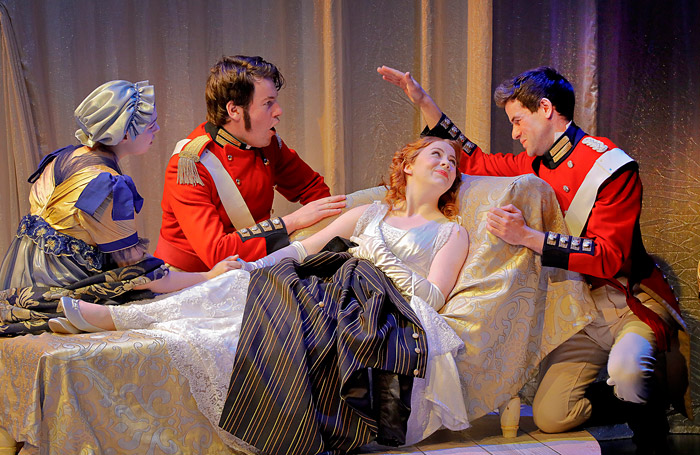There is a long relationship with J M Barrie at Pitlochry with regular productions of his plays over the years starting with the opening season in 1951. This year they have revived Quality Street, a comedy set in the time of the Napoleonic Wars. A hit from the beginning of the 20th century, the play fell out of fashion in the 1920s and was not produced for over six decades until the Finborough Theatre in London mounted a successful revival. Pitlochry has now brought this comedy of manners and mixed identity to their current repertoire.
Two sisters living on Quality Street set up and run a school for children after the local doctor heads off to fight Napoleon. Ten years later he returns, thinking that all the adventures have been his, and that the old life in Quality Street has waited, as in a sleep, to be resumed on the day of his return.
The charming set invokes the genteel blue and white parlour with opposing entrance doors of the two sister’s house. Phoebe Throssel, played by Fiona Wood, and Susan Throssel played by Camrie Palmer both who give strong, energetic performances.
This polite window on the world which is “seldom profaned by the foot of a man” is alternatively used in Act Two as a school room. Sounds of unruly schoolchildren offstage, and the comic horrors of the sisters as they try to cope with teaching algebra, give the audience an insight into the financial woes they have come to bear since the departure of the dashing doctor and would-be suitor to Phoebe, Valentine Brown, played stolidly by Alan Mirren, leaving their investments in tatters and the sisters condemned to be old maids.
What follows is a attempt to woo him again by Phoebe when he returns after ten years by pretending to be Miss Livvy, a younger and more energetic version of herself. There is a trip to a ball, played very nicely in front of drapes, leaving opportunities for the supporting cast of gossips and young blades to perform comic cross overs, trips to the shrubbery and much fainting as the device begins to unravel – a gift for actors to hone their skills at farce. The prime comedy moments are delivered by the maid Patty, admirably played by Helen Logan.
Playing a period piece requires a lightness of touch from the director and clever comic timing from the lead protagonists. It’s a mix between classic “stand and deliver”, modern comedy, physicality in period costume/footwear and above all timing. The ensemble work hard but don’t quite deliver and at times the pace slows, but in the end the show, with its excellent production values, wins you over.
And did you know that the Quality Street chocolates beloved of us all at Christmas were named after the play?
